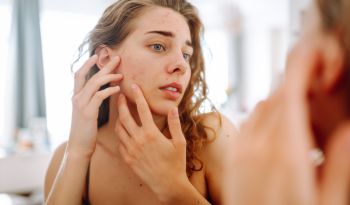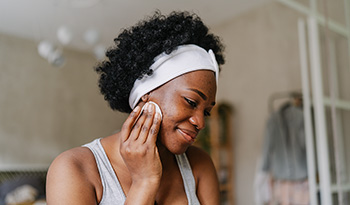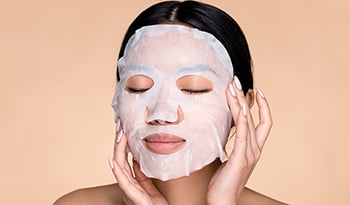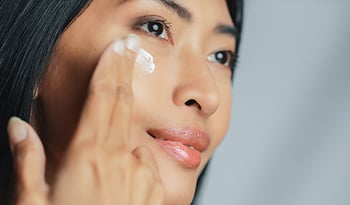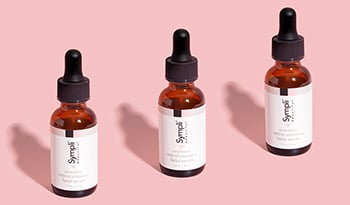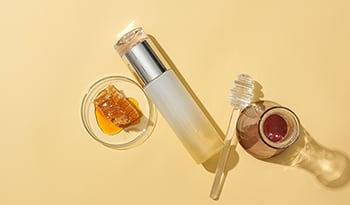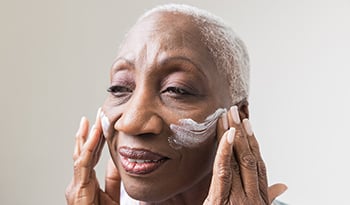3 ok, amiért a peptideknek szerepelniük kell a bőrápolási rutinban
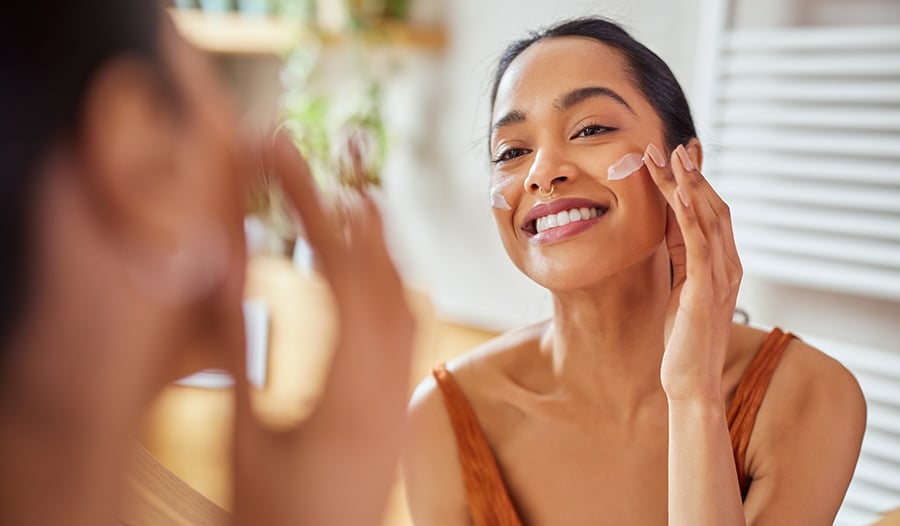
A peptidek nem éppen az új gyerek a blokkban, ha bőrápolási összetevőkről van szó. Az elmúlt két évben a népszerűség folyamatos növekedésével a peptidek egyre több öregedésgátló termékbe kerültek - és sok szépségrajongó és bőrszakértő egyetért abban, hogy a peptidek előnyei a bőrápolásban érdemelnek figyelmünket.
De mik azok a peptidek pontosan, és mit kellene tenniük a bőrünkkel? Ha kíváncsi voltál, hadd mondjam el, egy igazgatósági tanúsítvánnyal rendelkező bőrgyógyász, hogy lebontsam a peptidek mögött álló tudományt, és miért érdemes őket beépíteni a bőrápolási rendbe.
Mik azok a peptidek?
A peptideket úgy gondolhatjuk, mint a fehérjék építőköveit, amelyeket az aminosavak különböző kombinációinak láncai alkotnak. A testünkben található több ezer természetben előforduló peptidmolekula különféle jelátviteli funkciókat lát el a homeosztázis vagy egyensúly fenntartása érdekében a rendszerünkön belül.
A bőrben a peptidek alkotják a kollagént, az elasztint és a keratinot — mindannyian olyan fehérjék példái, amelyek fontos szerepet játszanak a bőrünkön belüli támogatás és szerkezet fenntartásában. Ahogy öregszünk, elveszítjük a kollagént és elasztint, aminek következtében elveszítjük a bőrünk egészséges, fiatalos megjelenésének megőrzéséhez szükséges támasztást és szerkezetet. Ez tompassághoz, finom vonalakhoz és ráncokhoz, látható texturális változásokhoz, csökkent szilárdsághoz vezet... megkapja a képet.
A peptidek előnyei a bőrápolásban
A peptidek népszerű bőrápolási összetevők, mivel állítólag könnyen felszívódnak a bőrbe, és különféle funkciókat látnak el, beleértve a korai öregedés jeleinek csökkentését is. Ahhoz, hogy megértsük, hogyan működnek a peptidek, tegyünk egy lépést hátrafelé, és merüljünk bele a bőr öregedésének fiziológiájába.
A bőr fibroblasztokat tartalmaz, speciális sejteket, amelyek felelősek bőrünk extracelluláris mátrixának (ECM) kialakulásáért. Az ECM egy komplex és dinamikus szervezeti struktúra, amely bőrünk száraz tömegének több mint 70% -át teszi ki, és felelős a bőr regenerációjáért. Amikor az ECM lebomlik a kollagén és az elasztin lebomlása miatt, az öregedés látható jelei jelentkeznek.
A bőrápolásra tervezett peptidek helyi alkalmazása elősegíti a kollagén- és elasztintermelést azáltal, hogy komplex jelátviteli kaszkádokon keresztül stimulálja ezeket a fibroblasztokat, ami viszont elősegíti az öregedéssel előforduló sejtek öregedésének leküzdését. És ez nem mind elméleti - számos tanulmány bizonyítja, hogy a peptidek képesek javítani az arcvonalak megjelenését, és növelni a bőr simaságát és feszességét.
Peptideket tartalmazó termékek a következő előnyökkel járhatnak:
- Csökkentse a finom vonalakat és ráncokat: A peptidtartalmú termék kiváló kiegészítője lehet az öregedésgátló bőrápolási rutinnak a kollagén-fokozó tulajdonságai miatt, amelyek végső soron csökkentik a finom vonalak megjelenését azáltal, hogy feltöltik a bőrt.
- Hidratálás és fokozott gátló funkció: A peptidek képessége a hidratálást gátolni a hidratáló krémek gyakori összetevőjévé teszi őket, és fokozza a bőr természetes gátfunkcióját, amely az első védelmi vonalunk a külső fenyegetések ellen. A bőrgát létfontosságú a rosszak (azaz toxinok, vegyszerek és fertőző ágensek) elkerüléséhez, miközben egyidejűleg megtartja a jót (a bőrön keresztüli vízveszteség megelőzésével).
- Megnyugtatja a pattanásra hajlamos vagy érzékeny bőrt: Az antioxidánsokat tartalmazó peptidek különösen hasznosak azok számára, akiknek pattanásra hajlamos vagy érzékeny bőrük van a peptidek gyulladáscsökkentő tulajdonságai miatt, amelyek nyugtató és nyugtató hatást fejtenek ki.
Peptidek típusai
Különböző peptidek különböző funkciókat látnak el a bőrön belül. Ezért sok termék egynél több peptidet használ ugyanabban a készítményben. A kozmetikumokban négy fő peptidek csoportja van:
- jelpeptidek
- hordozó peptidek
- enzimgátló peptidek
- neurotranszmitter peptidek
Minden csoport más úton működik, hogy kifejtse öregedésgátló hatását.
Jelpeptidek
A jelpeptidek a leggyakrabban használt peptidek a bőrápolásban. Ezek arra szolgálnak, hogy üzeneteket vagy jeleket küldjenek a bőrnek, hogy fokozzák a kollagén, elasztin és más fontos fehérjék termelését.
Hordozó peptidek
A hordozó peptidek nyomásványi anyagokat, például rézt hoznak a bőrbe. Évtizedek óta tudjuk, hogy a réz kritikus fontosságú az érett, funkcionális kollagén szintéziséhez. (Érdekes tény: a rézkomplexek az öregedés megjelenését is leküzdik az öregedés megjelenésével az öregedés megvilágításával!)
Enzim gátló peptidek
Az enzimgátló peptidek lelassítják az idő múlásával előforduló természetes kollagénveszteséget.
Neurotranszmitter peptidek
A neurotranszmitter peptidek simítják a finom vonalak megjelenését azáltal, hogy blokkolják az izomösszehúzódásban részt vevő idegjeleket. Tudja, hol találhatók még a neurotranszmitter peptidek? Injektálható neurotoxinok, mint a Botox! Valójában sokan a bőrápolásban található neurotranszmitter peptideket a „topikális Botoxhoz” hasonlították.
Mielőtt túlságosan izgatott lennél, fontos megjegyezni, hogy egy helyi termék valószínűleg nem okoz közel azonos fokú izomlazítást, mint egy injektálható neurotoxin egyszerűen azért, mert nem tud olyan mélyen behatolni a bőrbe — a botox és más neurotoxinok (Dysport, Xeomin) továbbra is uralkodnak ezen a fronton.
Hogyan használjuk a peptideket a bőrápolásban
Tehát hol kezdje el a bőrápolási folyosót, amikor egy peptidtartalmú termék beépítésének módjait keres? Valószínűleg a legtöbb előnyt akkor fogja elérni, ha olyan terméket keres, mint például egy hidratáló, szérumvagy szemkrém.
Hidratáló szerek
A multitasking termékek a legjobb megoldás. A peptidek jól működnek a hidratálókban leggyakrabban előforduló legtöbb összetevővel. Keressen olyat más hasznos összetevőkkel, mint a hialuronsav, niacinamid, szkvalánés B5-vitamin.
Az Olay Regenerist Collagen Peptide 24 hidratáló hidratálóegy szabadalmaztatott, ultra-kicsi mikropeptidet tartalmaz, amely elősegíti a kiváló felszívódást.
Szérumok
Sűrített termék esetén hidratáló alá rétegezhet, vagy szérumot fontolhat meg. A DERMA E Advanced Peptides & Collagen Serum és a Sympli Beautiful Age Fining Facial Oil egyaránt több peptid erejét használja fel képletükben.
Szemkrémek
A finom szemhéj alatti területeknél vegyen figyelembe egy vitaminokkal és peptidekkel teli szemkrémet, például a CosRx Advanced Snail Mucin Peptide szemkrémet, amely öt különböző peptidet tartalmaz. A Neutrogena Peptide Multi Action Eye Cream egy másik jól átfogó lehetőség, amely két különböző peptidet, valamint B, Cés E vitaminokat tartalmaz, amelyek elősegítik a szem alatti fényesedést és kipufogást.
Lapmaszkok
Ha egy kis extra kényeztetést szeretne kikapcsolni, próbáljon ki egy peptid alapú lepedőmaszkot, mint a Mary & May Collagen Peptide Vital Beauty Mask by Mary & May vagy a Lapcos Collagen Beauty Firming Sheet Mask.
Orális peptidek
A szépségvilág peptideiről szóló cikk nem lenne teljes az orális kollagénkiegészítőkemlítése nélkül. Gyakran kérdezik tőlem az öregedésgátló étrend-kiegészítőkről és arról, hogy megérik-e a pénzt, szóval töltsünk egy kis időt az elfogyasztható orális peptidkiegészítőkről.
A kollagénkiegészítők ellentmondásos téma a bőrgyógyászat területén, mivel hiányoznak robusztus, jól kidolgozott klinikai vizsgálatok, amelyek a bőrápolásra gyakorolt hatásukat vizsgálják. A kollagénpeptidek szájon át történő fogyasztása megkönnyítheti azok bejutását és felszívódását az emésztőrendszeren keresztül a véráramba. A helyi alkalmazáshoz képest ennek a kívánt kollagénstimuláló hatás hatékonyságának növelését kell eredményeznie.
Bár még nem léteznek erős, végleges bizonyítékok az étrendi kollagén peptidkiegészítők rutinszerű ajánlásának alátámasztására, tudjuk, hogy nagyon biztonságosnak tekinthetők, és az öregedésen túl előnyökkel járhatnak, beleértve a csontok és ízületek egészségét is. Ennek ellenére jó ötlet bármilyen új étrend-kiegészítőt futtatni orvosa által.
Tippek a peptidek használatához
Akár peptideket szeretne használni szérumok, tisztítószerek, hidratálók vagy maszkok formájában, íme néhány hasznos tipp, amelyet szem előtt kell tartani. A legtöbb elég gyengéd a napi kétszeri használatra; azonban, hogy a legtöbbet hozza ki a termékéből, kerülje bizonyos hatóanyagokkal, például AHA-kkal (alfa-hidroxi-savakkal) egyidejű alkalmazását, mivel a savak lebontják a fehérjéket, és kevésbé hatékonyabbá tehetik a peptidszérumot vagy krémet. Napközben zárjon be mindent egy fényvédővel , mint utolsó lépést a sorozat befejezéséhez.
Végső gondolatok
A peptidek számos okból is izgalmasak. Egyrészt megértjük hatásmechanizmusukat és azt, hogy nagyon elegánsan működnek számtalan biológiai funkció támogatása érdekében. A kutatók folyamatosan új és innovatív módszereket fejlesztenek ezen ismeretek alkalmazására, és most olyan ponton vagyunk, amikor a peptidek kényelmesen megszilárdították pozíciójukat a keresett bőrápolási összetevőként.
Az elvárások meghatározása azonban a munkám része, és túlságosan optimista lenne azt gondolni, hogy önmagában a peptidek ugyanolyan hatékonyak lehetnek, mint az idősebb, jobban tanulmányozott öregedésgátló összetevők. Bár a peptidek nem helyettesítik a munkavarakat, például a retinoidokat, az antioxidánsokat és a fényvédőt, úgy gondolom, hogy kiegészíthetik a meglévő bőrápolási rutinokat.
Referenciák:
- Draelos ZD, Kononov T, Fox T. Egy peptidkezelő szérum és támogató rendszer nyílt klinikai vizsgálata, amelynek célja az öregedő arcbőr megjelenésének javítása. J Gyógyszerek a Dermatolban. 2016; 15 (9): 1100 - 1106.
- Lupo képviselő, Cole AL. Kozmegyógyászati peptidek. Dermatol Ther. 2007 szeptember-október; 20 (5): 343-9.
- Skibska A, Perlikowska R. Jelpeptidek - ígéretes összetevők a kozmetikumokban. Curr Protein Pept Tudomány 2021; 22 (10): 716-728.
- Widgerow AD, Fabi SG, Palesztina RF, Rivkin A, Ortiz A, Bucay VW, Chiu A, Naga L, Emer J, Chasan PE. Extracelluláris mátrix moduláció: A bőrápolási és fiatalító eljárások optimalizálása. J Gyógyszerek Dermatolban. 2016; 15 (4): s63-s71.
FELELŐSSÉGKIZÁRÓ NYILATKOZAT:A jelen blognak nem célja diagnózis felállítása...

















































































 Tartalomjegyzék
Tartalomjegyzék



